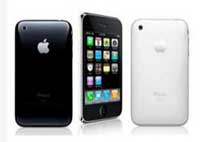iPhone: how much storage is enough?

In the rush to be the first person to own a 3G iPhone, people were apparently switching their brains off before joining the queue, so it's somewhat surprising that considering an appropriate amount of storage was quite a high priority for many buyers.

A month after the first iPhones hit the streets, I still find it jaw-droppingly amazing that people were willing to sign up more or less without any consideration of what plans they were going to have to use.
Early adopters have paid the price, as my colleague David Braue points out, since the plans have since become somewhat more reasonable for people who were willing to hang around and wait for the market to settle in. Apparently the iPhone-obsessed aren't suffering from the economic downturn.
I've no intention of buying an iPhone myself (I like having a real keypad), but between writing about it and watching endless debates about purchasing decisions on Twitter, I've encountered a fairly heavy volume of discussion of the buying process.
And while debate over the appropriate plans might have been embarrassingly minimal (witness all those people who flung $100 towards Optus without even knowing what was being offered), there have been two more basic points of debate.
One is which colour iPhone to purchase, with black generally being favoured over white (whether for cool factor or a sensible recognition that white gadgets end up looking mucky, I'm not sure). The other aspect — more germane to Snorage's view of the world — is whether it's worth coughing up the extra money for a 16GB model, rather than the entry-level 8GB option.
Early sales reports suggest that the 16GB model has proved more popular, with some buyers begrudgingly accepting the 8GB model in order to get their hands on a phone sooner.
I'd suggest that this has very little to do with the iPhone's performance as either a phone or an applications platform, and everything to do with its legacy role as a music player.
Even 8GB is enough to store more music than anyone's ever likely to listen to, and it's at the high end of what's on offer in the next-down Nano range. But it's still only a small fraction of what's available in a disk-based iPod classic.
If you've managed to fill up an 80GB model, then even the 16GB model will require you to make some musical sacrifices. (Add video into the equation and you can fill everything up much faster, of course).
The rising capacities of flash memory would seem to make it a safe assumption that future iPhone models may offer even more storage. On the other hand, if the data plans keep getting cheaper, remote access via the cloud might prove more appealing than whacking in some more memory.
In the corporate world, of course, more storage is not necessarily a good thing in this context. Despite the addition of Exchange support, the iPhone is still a lousy choice of smartphone for business users, since it's harder to manage and standardise en masse.
That doesn't mean that pushy executives aren't going to demand support for it, of course. The only comfort IT managers might be able to draw is that an 8GB model can only store half the volume of sensitive corporate information, though that's plenty enough information to cause a major embarrassment if it falls into the wrong hands.